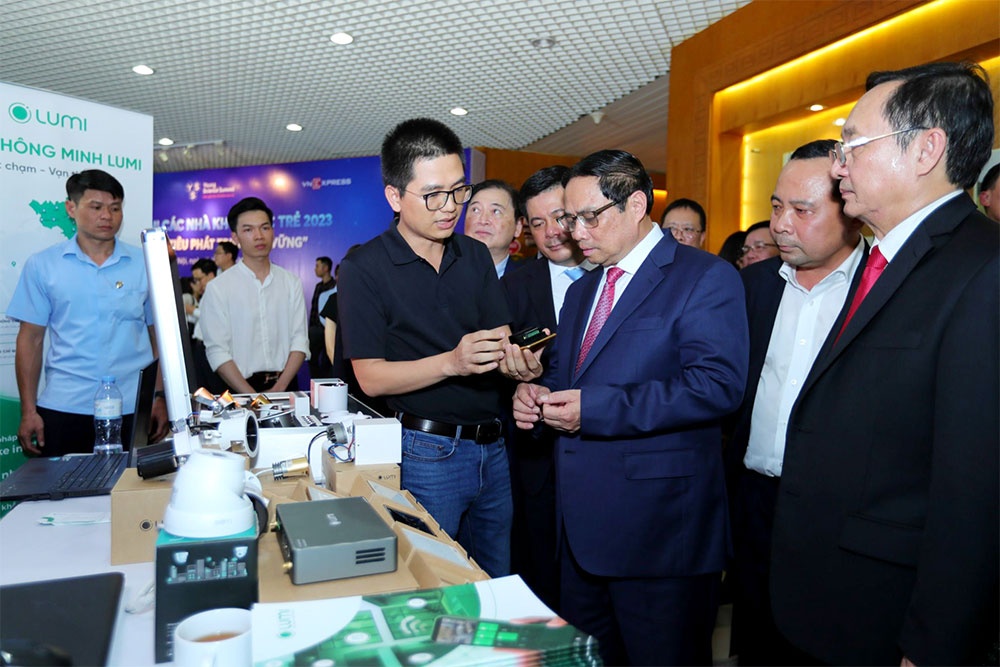Strategic vision in need for sci-tech breakthroughs
Vietnam strives to become a developing country with modern industry and high average income by 2030, and become a developed country with high income and by 2045.
 |
| Minister of Science and Technology HUYNH THANH DAT |
This orientation and expectation puts science and technology front and centre as the country aims to innovate in order to not fall behind and to flourish faster and more sustainably.
We are witnessing the rapid development of new technologies in the era of the Fourth Industrial Revolution, creating breakthrough changes in production process, socioeconomic management methods and human life, and also posing huge challenges to developing countries like Vietnam where qualifications and resources are limited.
Opportunities and challenges
We must frankly admit that our country’s sci-tech capacity and level are still weak and at risk of falling further behind, except for a few scientific fields that have strengths. Social sciences and humanities, natural sciences, and technical sciences, for example, have not been linked or developed synchronously.
The number of Vietnamese patents is still low. Although the number of international publications has increased in recent years, it is still lower than advanced countries in the region. The technology absorption capacity of Vietnamese enterprises is still weak. Innovative startups boast many prospects, but the number remains quite modest.
Although there have been many efforts in innovating the management mechanism of sci-tech activities, the mindset of not accepting risks and delays in scientific research is still popular, especially in financial management. The operational efficiency of sci-tech research facilities is still limited, lacking strong research groups and major scientific projects at the regional and international level.
The tech market and cooperation between research institutes, universities, and businesses are also developing at a low level, and the commercialisation rate of related research results is not high.
Nevertheless, it is also important to note that in recent years, despite the heavy impact of the pandemic and the general difficult context of the global and domestic economies, sci-tech activities have witnessed positive changes.
The management mindset in this area has been innovated and advanced. Innovative activities are emphasised, and startups based on technological ideas, intellectual property, and new business models are encouraged. The innovative startup ecosystem has been promoted and the spirit of open science and proactively responding to Industry 4.0 is strongly encouraged.
Enterprises are gradually considered the centre of the national innovation system, are encouraged to establish sci-tech development funds and participate in public-private cooperation to deploy relevant tasks to create products in the value chain of Vietnamese brands. The government’s strong innovation encouragement has been helping large domestic enterprises make strategic investments in industrial tech and innovative startups.
This trend increases the proportion of sci-tech investment among businesses and society, opening up prospects for Vietnam to quickly improve national capacity and shortening the gap with regional nations and beyond.
While there are still many challenges in practical implementation, efforts to remove obstacles and innovate in investment and financial management have had a positive impact on the potential and level of science and technology in this country. Advanced research institutes and strategic programmes have taken shape, implemented in both the public and private sectors.
The number of scientific articles published internationally has also increased rapidly; new tech and high technologies are applied more widely in the agricultural, industrial, and service sectors. Despite limited resources, relevant stakeholders have made practical contributions to socioeconomic development, maintaining national defence and security, and improving the quality of people’s lives.
Strategic vision requirements
The Fourth Industrial Revolution, the trend of open science and open innovation, the aftershocks of the pandemic, and geopolitical uncertainty around the world have been and are continuing to create a lot of pressure and great challenges for a developing country like Vietnam.
It is necessary to continue to innovate thinking, improve competitiveness and resilience, and flexibly adapt and act promptly, while taking solutions to enhance long-term potential.
It is necessary to stimulate demand for technology from businesses, requiring synchronous implementation of long-term solutions in economic restructuring, innovating growth models, and improving growth quality and competitiveness of the economy, including the development of related digital infrastructure.
From a policy perspective, it needs to focus on strengthening the technology absorption capacity of businesses by continuing to encourage businesses to invest in establishing science and tech funds, establishing research and development facilities, supporting businesses to improve human resources, and expanding forms of funding and loans from state funds.
It is vital to strengthen public-private partnerships in implementing large-scale projects and supporting innovation startups, firstly with large domestic industrial tech corporations.
It is important to innovate thinking on giving autonomy and self-responsibility to public sci-tech organisations in accordance with international practices; provide maximum autonomy associated with accountability; dissolve inefficient units to focus investment resources on strong units; and create conditions for institutes, schools, and businesses to access open databases and global knowledge networks to optimise investment efficiency under low-cost conditions.
Respecting the specific characteristics of risks and delays in scientific research is important to innovate methods of management and use the state budget in implementing sci-tech tasks. There must also be measurement and evaluation methods consistent with international practices on the results, effectiveness, and impact of science and technology activities.
Another policy aspect is to implement the principle of granting ownership of the results of sci-tech tasks using the state budget to research institutes and universities under an automatic mechanism without licensing and without reimbursement of initial investment costs, except in cases where the state is required to take ownership.
They must also clearly define and strictly control the implementation of the benefit sharing mechanism between parties in commercialising results, ensuring the rights of innovation subjects and focusing on reinvestment in sci-tech activities.
 |
A modern and natural foundation
In the era of Industry 4.0, it is not technology but intellectual and human resources that will determine a country’s success in the development race to bring prosperity to the people and the country.
If a startup nation encourages the entrepreneurial spirit and the birth of new generation entrepreneurs, if it encourages a culture of creativity, and if it encourages innovators to dare to step out of their comfort zone and accept risks and failures to attain success, dreams can be turned into reality.
Finally, it is necessary to continue to invest in synchronous development and strengthen the connection of related sectors to gather strength to be able to contribute more strongly to the country’s development goals. It is key to maintain the principle of valuing social sciences and humanities, investing fundamentally in natural sciences, and prioritising science and engineering and technology.
For social sciences and humanities, it is necessary to continue to ensure the provision of scientific basis for planning policies and guidelines for national development, maintaining political security, and protecting integrity, national sovereignty, and fostering and promoting Vietnamese cultural, social, and human values.
With the scale and level of an economy still at a low average level compared to elsewhere, the need to strongly apply sci-tech achievements to national industrialisation and modernisation is huge, requiring us to immediately focus on applied development.
However, major modern challenges such as ecological imbalance, environmental pollution, natural resource depletion, and moral and cultural decline not only require tech breakthroughs but also require solutions from natural sciences, social sciences, and humanities. New factors in Industry 4.0 only become truly useful when people know how to use them for appropriate purposes.
That is why we need a strategic vision for the coming decades and a reasonable funding plan for basic research in the natural sciences, social sciences, and humanities in parallel with our priorities in applied research to develop technology, joining forces to build a solid foundation and thus contributing to the country’s prosperous and sustainable evolution.
 | Hanoi – attractive city for startup and innovation Hanoi has been honoured for its attractiveness in startup and innovation under the Vietnam Smart City Award 2023 programme series. |
 | Policy ecosystem the answer for cutting-edge startups While Vietnam’s environment for the development of the innovation startup ecosystem is becoming more favourable, full legal and policy corridors are in need to help them take off. |
| Vietnam’s infrastructure ready for semiconductor industry A roundtable on Vietnam’s infrastructure readiness for semiconductor industry in Vietnam was organised by the Ministry of Planning and Investment (MPI) in collaboration with the National Innovation Centre (NIC) and the US Semiconductor Industry Association (SIA) in Hanoi on December 7. |
What the stars mean:
★ Poor ★ ★ Promising ★★★ Good ★★★★ Very good ★★★★★ Exceptional
 Tag:
Tag:
Related Contents
Latest News
More News
- Masan Consumer names new deputy CEO to drive foods and beverages growth (February 23, 2026 | 20:52)
- Myriad risks ahead, but ones Vietnam can confront (February 20, 2026 | 15:02)
- Vietnam making the leap into AI and semiconductors (February 20, 2026 | 09:37)
- Funding must be activated for semiconductor success (February 20, 2026 | 09:20)
- Resilience as new benchmark for smarter infrastructure (February 19, 2026 | 20:35)
- A golden time to shine within ASEAN (February 19, 2026 | 20:22)
- Vietnam’s pivotal year for advancing sustainability (February 19, 2026 | 08:44)
- Strengthening the core role of industry and trade (February 19, 2026 | 08:35)
- Future orientations for healthcare improvements (February 19, 2026 | 08:29)
- Infrastructure orientations suitable for a new chapter (February 19, 2026 | 08:15)


















 Mobile Version
Mobile Version